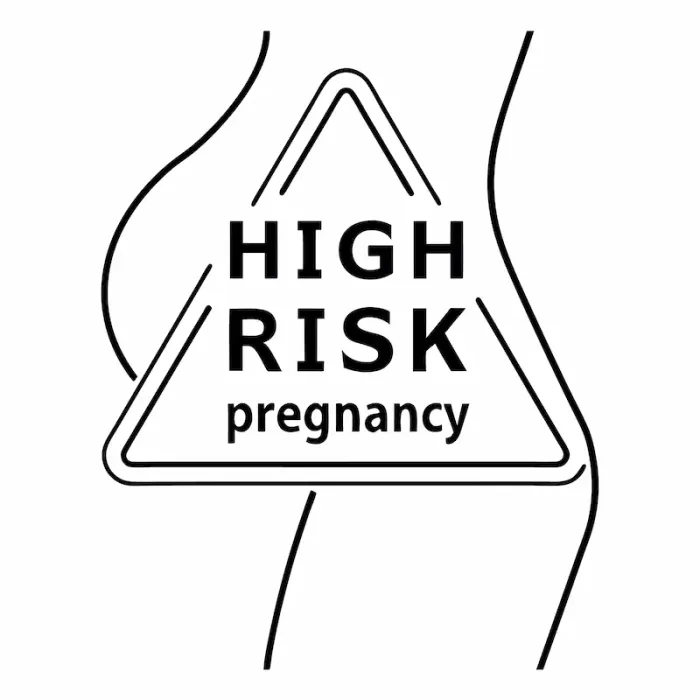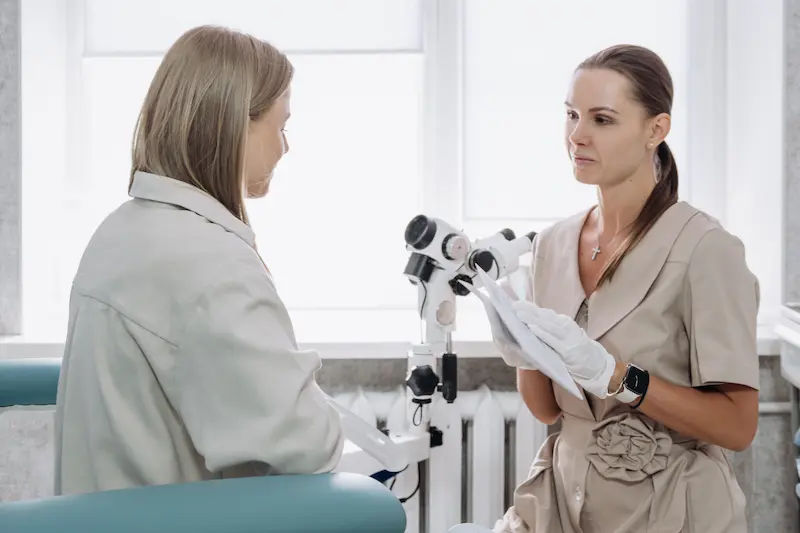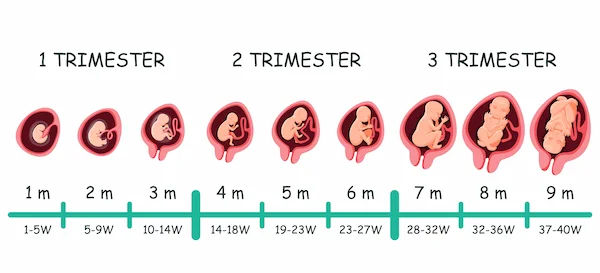Navigating a High-Risk Pregnancy: A Comprehensive Guide for Expecting Parents
Discover everything you need to know about high-risk pregnancy, including causes, essential tests, monitoring, and proactive care tips for a healthy outcome for both mother and baby.

Written by Dr. J T Hema Pratima
Reviewed by Dr. D Bhanu Prakash MBBS, AFIH, Advanced certificate in critical care medicine, Fellowship in critical care medicine
Last updated on 13th Jan, 2026

Introduction
Hearing the term "high-risk pregnancy" can be overwhelming and frightening for any expectant parent. It's crucial to understand that this label doesn't predict a negative outcome; rather, it signifies that you and your baby may require extra care, monitoring, and specialised expertise throughout your pregnancy journey. This designation is a proactive measure, not a prognosis. This comprehensive guide is designed to demystify what a high-risk pregnancy entails, explore the common causes, and outline the advanced care plans that help ensure the healthiest possible outcome for both mother and child. We'll walk you through what to expect, from specialised tests to building your support team, empowering you with knowledge and reassurance every step of the way.
Common Causes and Risk Factors of a High-Risk Pregnancy
A pregnancy is classified as high-risk when there are potential complications that could affect the mother, the baby, or both. These factors often require management by a specialist to minimise risks. They generally fall into a few key categories.
Pre-Existing Medical Conditions
Certain health conditions present before pregnancy can significantly impact its course. Autoimmune diseases like lupus, chronic hypertension, diabetes, kidney disease, and thyroid disorders are prime examples. For instance, poorly controlled diabetes before conception increases the risk of birth defects and miscarriage. The key to managing these conditions is often preconception counselling and tight control of the condition before and during pregnancy. If you have a chronic condition, consulting a doctor online with Apollo24|7 for preconception advice can be an excellent first step.
Age-Related Risk Factors
Maternal age plays a significant role in pregnancy risk. Teen mothers face a higher risk of pre-eclampsia and anaemia. Conversely, pregnancy after 35 (advanced maternal age) is associated with a greater likelihood of chromosomal abnormalities like Down’s syndrome, as well as a higher risk of developing gestational diabetes and hypertension. However, with proper screening and care, millions of women over 35 have perfectly healthy pregnancies and babies.
Lifestyle and Environmental Factors
Choices and environment matter. Smoking, alcohol use, and illicit drug use during pregnancy are leading preventable causes of birth defects and intellectual disabilities. Exposure to certain toxins, lead, or radiation can also elevate risk. Maintaining a healthy weight is also critical, as obesity increases the chances of gestational diabetes, pre-eclampsia, and the need for a C-section.Consult a Gynaecologist for the best advice
Pregnancy-Related Complications
Sometimes, issues arise during the pregnancy itself that warrant the high-risk label. These include:
• Gestational Diabetes: Diabetes that develops during pregnancy.
• Pre-eclampsia: A serious blood pressure disorder.
• Placenta Praevia: When the placenta covers the cervix.
• Preterm Labour: Labour that begins before 37 weeks.
• Multiple Gestation: Carrying twins, triplets, or more.
Essential Tests and Monitoring During a High-Risk Pregnancy
If your pregnancy is deemed high-risk, you can expect a more rigorous schedule of prenatal tests for high-risk pregnancy. This isn't meant to cause anxiety but to provide a wealth of information to keep you and your baby safe.
First Trimester Screening and Diagnostics
Early screening is vital. This often includes a nuchal translucency ultrasound to measure fluid at the back of the baby's neck, combined with blood tests (PAPP-A and hCG) to assess the risk of chromosomal conditions. For higher-risk cases, diagnostic tests like Chorionic Villus Sampling (CVS) (around 10-13 weeks) or amniocentesis (15-20 weeks) may be offered to get a definitive diagnosis. Apollo24|7 offers convenient home collection for many essential blood tests, making this part of your monitoring easier.
Second and Third Trimester Monitoring
As pregnancy progresses, monitoring intensifies. This includes:
• Anatomy Scan (18-22 weeks): A detailed ultrasound to check foetal development.
• Glucose Challenge Test: To screen for gestational diabetes.
• Biophysical Profile (BPP): A test that combines an ultrasound to check foetal movement, tone, breathing, and amniotic fluid volume with a non-stress test.
• Non-Stress Test (NST): Measures the baby's heart rate in response to its movements.
• Doppler Flow Studies: Uses ultrasound to check blood flow in the umbilical artery and the baby's brain.
The frequency of these ultrasounds and tests will be tailored to your specific situation, ensuring any potential issues are caught and managed early.
Proactive Management: Tips for a Healthier Pregnancy Journey
While medical care is paramount, there's much you can do to actively contribute to a positive outcome.
Nutrition and Diet Considerations
Eating a balanced diet rich in folate, iron, calcium, and protein is non-negotiable. If you have gestational diabetes, you’ll work with a nutritionist to create a meal plan that manages your blood sugar. Staying hydrated is also critical. Think of food as fuel that directly supports your baby's development and your own strength.
The Role of Safe Physical Activity
Unless your doctor has prescribed bed rest, staying active is beneficial. Activities like walking, swimming, and prenatal yoga can help reduce back pain, improve mood, boost energy levels, and promote better sleep. Always get clearance from your healthcare provider before starting or continuing any exercise regimen.
Prioritising Mental and Emotional Wellbeing
The stress of a high-risk pregnancy is real. It's essential to build a strong support system. Talk openly with your partner, family, and friends. Consider joining a support group for women in similar situations. Practices like mindfulness, meditation, and prenatal massage (with doctor approval) can significantly reduce anxiety and improve your overall emotional health.
Conclusion
A high-risk pregnancy journey is undoubtedly filled with more monitoring and medical attention, but it is first and foremost a pregnancy—a time to be met with knowledge, support, and hope. Understanding the causes, embracing the specialised care plan, and actively participating in your health through lifestyle choices are your greatest tools. Remember, you are not alone. You are surrounded by a dedicated team of professionals whose sole focus is on the health of you and your baby. By asking questions, attending all appointments, and prioritising your physical and mental wellbeing, you are taking powerful, proactive steps towards a positive outcome. If you have any concerns at all during your pregnancy, never hesitate to reach out to your healthcare provider. For ongoing management of chronic conditions or specialist consultations, platforms like Apollo24|7 can provide accessible and expert guidance throughout your journey.
Consult a Gynaecologist for the best advice
Consult a Gynaecologist for the best advice

Dr. Mona Yadav
Obstetrician and Gynaecologist
19 Years • MBBS, MD (Obstetrics & Gynaecology)
Dombivli
Nulife multispeciality, Dombivli

Dr. Parul Sharma
Obstetrician and Gynaecologist
8 Years • MBBS, MS (Obstetrics & Gynaecology)
New Delhi
THE DOCTORS NESST, New Delhi

Dr. Debajyoti Goswami
Obstetrician and Gynaecologist
10 Years • MBBS,D.G.O(DNB),Adv. Infertility Tech.(AIIMS),Fellowship in Diabetes(U.K),Comprehensive Abortion Care(Govt. Of W.B), Certificate in Clinical Embryology(AIIMS, BHUBANESWAR)
Bankura
D.G Clinic, Bankura
(25+ Patients)
Dr. K Anusha
Obstetrician and Gynaecologist
4 Years • MBBS, DGO
Yemmiganur
SRINIVASAA HOSPITAL, Yemmiganur

Dr. Asha Rani Singh
Obstetrician and Gynaecologist
24 Years • MBBS DGO
Delhi
Dr Asha Rani Singh Clinic, Delhi
Consult a Gynaecologist for the best advice

Dr. Mona Yadav
Obstetrician and Gynaecologist
19 Years • MBBS, MD (Obstetrics & Gynaecology)
Dombivli
Nulife multispeciality, Dombivli

Dr. Parul Sharma
Obstetrician and Gynaecologist
8 Years • MBBS, MS (Obstetrics & Gynaecology)
New Delhi
THE DOCTORS NESST, New Delhi

Dr. Debajyoti Goswami
Obstetrician and Gynaecologist
10 Years • MBBS,D.G.O(DNB),Adv. Infertility Tech.(AIIMS),Fellowship in Diabetes(U.K),Comprehensive Abortion Care(Govt. Of W.B), Certificate in Clinical Embryology(AIIMS, BHUBANESWAR)
Bankura
D.G Clinic, Bankura
(25+ Patients)
Dr. K Anusha
Obstetrician and Gynaecologist
4 Years • MBBS, DGO
Yemmiganur
SRINIVASAA HOSPITAL, Yemmiganur

Dr. Asha Rani Singh
Obstetrician and Gynaecologist
24 Years • MBBS DGO
Delhi
Dr Asha Rani Singh Clinic, Delhi
More articles from pregnancy
Frequently Asked Questions
1. Can a high-risk pregnancy still result in a healthy baby?
Absolutely. The vast majority of high-risk pregnancies, with proper and consistent medical care, result in the birth of healthy babies. The 'high-risk' label allows doctors to provide the intensive monitoring and intervention needed to achieve this positive outcome.
2. Will I definitely need a C-section if my pregnancy is high-risk?
Not necessarily. While some conditions like placenta praevia or a transverse baby require a C-section, many women with high-risk pregnancies can have successful vaginal deliveries. Your delivery method will be a decision made with your care team based on what is safest for you and your baby at term.
3. What are the warning signs I should watch for?
Contact your doctor immediately if you experience severe headaches, vision changes, sudden swelling, persistent abdominal pain, vaginal bleeding or fluid leakage, a significant decrease in foetal movement, or contractions before 37 weeks.
4. Does having one high-risk pregnancy mean future pregnancies will be high-risk?
Not always. It depends on the reason for the initial classification. For example, a pregnancy risk due to twins is unlikely to repeat, while a risk due to a chronic condition like diabetes will require the same careful management in future pregnancies.
5. How can I reduce my anxiety about my high-risk pregnancy?
Education is empowering. Learn about your specific condition, build a trusted support system of family, friends, and healthcare providers, and don't hesitate to seek help from a therapist who specialises in maternal mental health. Practices like prenatal yoga and meditation can also be very effective.




